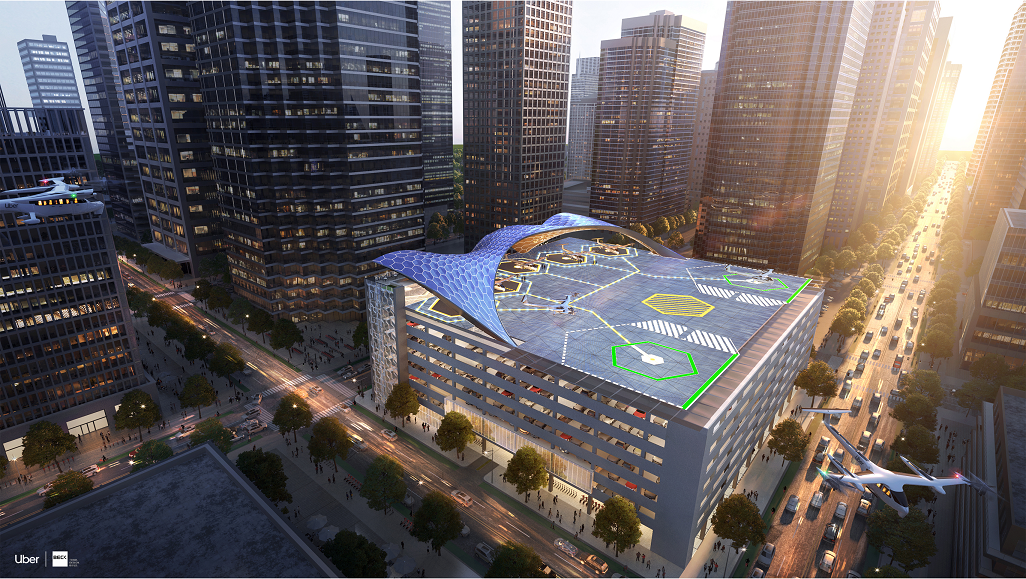
A rendering by the Beck Group of an Uber Skyport retrofit in Dallas. (Uber/Beck Group)
Uber announced a series of partnerships to tackle the infrastructure and operations challenges that surround the operation of air taxis in urban environments.
To conduct skyport operations, Uber will partner with Signature Flight Services, which runs “the world’s largest network of private aviation terminals,” according to Signature’s Chief Commercial Officer Shawn Hall, with more than 200 locations globally.
Signature is also Uber’s partner for Uber Copter, its urban air mobility solution using traditional helicopters set to launch next month in New York.
“We’re the proud partner for fulfilling [Uber Copter] and making that a reality. And that’s really just a building block for us to test and learn so that we can go and apply it to flying eVTOL,” Hall said.
For its first Uber Skyport, the ridesharing giant will team with real estate developer Related Companies. Plans are to construct the first skyport in Santa Clara, California, where Related has a 240-acre urban development in progress. Related joins Hillwood as Uber’s second real estate partner in the aviation space, with the latter focused on the Dallas-Fort Worth area of Texas.
“We are excited to announce a partnership with Uber with the vision of developing skyports across the country,” said Jeff Blau, CEO of Related. “We are determined to be at the forefront of developing the infrastructure that is integrated into multi-modal platforms like Uber.”
Uber envisions its skyports as “mobility hubs,” connecting users of Uber Air to other types of Uber transport. Built from preexisting parking garages, these mobility hubs will include dedicated pickup/dropoff space for Uber drivers, access and charging areas for Uber bikes and scooters and even UberEats with café seating.
Uber, which hopes to become more of an all-around mobility provider than a ridesharing app, also tasked a number of design firms with presenting their visions of an Uber Skyport Mobility Hub. Building on last year’s presentations, which focused on the operational requirement of launching 1,000 flights per hour on 2 acres of land, Uber asked Beck, Gensler, SHoP, Corgan, Arup and other companies to present actionable visions.
“This year we invited some of the world’s most innovative design and architecture teams back to imagine the first generation of connected skyport mobility hubs that could be connected into the urban landscape of Los Angeles, Dallas, and Melbourne in 2023,” said John Badalamenti, head of design for Uber Elevate.

Rendering of an Uber Skyport in LA by SHoP. (Uber/SHoP)
“We gave them a common footprint and asked them to retrofit a notional parking structure with clear community integration, with dedicated pickup and dropoff zones for uber pool, transit, and micromobility.”

Want more eVTOL and air taxi news? Sign up for our brand new e-letter, “The Skyport,” where every other week you’ll find the most important analysis and insider scoops from the urban air mobility world.